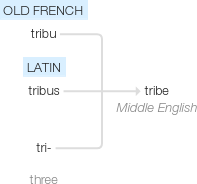Tribe
Middle English: from Old French tribu or Latin tribus (singular and plural); perhaps related to tri- ‘three’ and referring to the three divisions of the early people of Rome.
wiktionary
From Middle English tribe, tribu, from Old French tribu, from Latin tribus. Doublet of tribus.
etymonline
tribe (n.)
mid-13c., "one of the twelve divisions of the ancient Hebrews," from Old French tribu or directly from Latin tribus "one of the three political/ethnic divisions of the original Roman state" (Tites, Ramnes, and Luceres, corresponding, perhaps, to the Latins, Sabines, and Etruscans), later, one of the 30 political divisions instituted by Servius Tullius (increased to 35 in 241 B.C.E.), of unknown origin. Perhaps from tri- "three" + *bheue-, root of the verb be. Others connect the word with the PIE root *treb- "a dwelling" (see tavern).
In the Biblical sense, which was the original one in English, the Latin word translates Greek phyle "race or tribe of men, body of men united by ties of blood and descent, a clan" (see phylo-). Extension to modern ethnic groups or races of people is from 1590s, specifically "a division of a barbarous race of people, usually distinguishable in some way from their congeners, united into a community under a recognized head or chief" [Century Dictionary], but colloquially of any aggregate of individuals of a kind.
